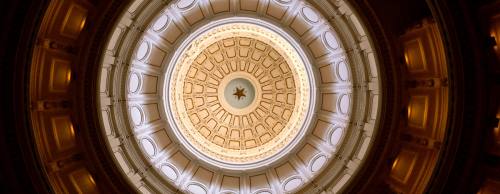At Tuesday's Round Rock Chamber Power Lunch, Texas Association of Business President Chris Wallace summarized the 85th legislative session as being the most anti-business and anti-economic development in years due to the filing of major discriminatory legislation.
Wallace said in the future, TAB must adapt by becoming involved on a local level and running pro-business candidates.
"You are going to see your state chamber become more involved and penetrating your local districts by running pro-business local candidates," he said.
Subject by subject, Wallace outlined TAB's high and low points of the session.
In TAB's win column is the passage of
Senate Bill 1107, which paves the way for telemedicine; the passage of
House Bill 1774, which reforms the hail-storm lawsuit process; the passage of
House Bill 100, which overrides local ride-hailing ordinances in lieu of a statewide blanket regulation; and the defeat of
a package of eminent domain bills that would have killed the private Texas Central rail project to be constructed from Houston to Dallas.
In addition, Wallace spoke about the defeat of legislation that
would have allowed what he called "trade secrets" to become public record for private businesses.
Finally, Wallace said one of TAB's big victories was the defeat of
Senate Bill 6 and
House Bill 2899 which would have regulated bathroom usage based on biological gender. Wallace said these bills would have hindered Texas business from attracting, recruiting and retaining top talent and would have tarnished Texas' reputation as open and business-friendly.
Prior to the start of the regular session, TAB formed Keep Texas Open, a coalition of interests against the passage of such bills. This was by far issues most vocally and vehemently opposed by TAB.
As a result, TAB said both bills failed in the regular session. Gov. Greg Abbott has already added these topics to the list of special session charges, so they could return.
The only issue that Wallace addressed as TAB's key loss of the session was the passage of
Senate Bill 4, often called the "sanctuary city bill." The bill
prohibits local agency policies that would prohibit officers from inquiring about immigration status. It also enforces civil and criminal penalties for leaders of entities who refuse to comply with what are now optional detainer requests from United States Office of Immigration and Customs Enforcement.
The bill is set to go into effect on Sept. 1, but is facing numerous legal challenges before that time.
Wallace said TAB was neutral on the bill throughout the session until an amendment was tacked on in the House that allows officers to inquire about immigration status during legal stops. Legal stops can occur because of a broken taillight or a speeding ticket.
"We were pretty neutral on sanctuary cities until an amendment was put into it to show me your papers," he said.
Going forward, Wallace said TAB might have reason to change its tune on another key bill for the legislative session, Senate Bill 2, which would restrict the growth of property tax rates at a municipal and county level.
TAB, which has previously been neutral on the topic, is holding a board meeting on Friday, and will likely discuss the topic there.
Wallace said the savings lawmakers are touting for SB2 might not be as significant as some in business originally thought. He said the savings doesn't pan out when compared to the risk cities, counties and community college districts take on with a capped amount of revenue they can take in each year.
Until the TAB board of directors reevaluates its stance on SB2, the group is imploring lawmakers to revisit school finance.




